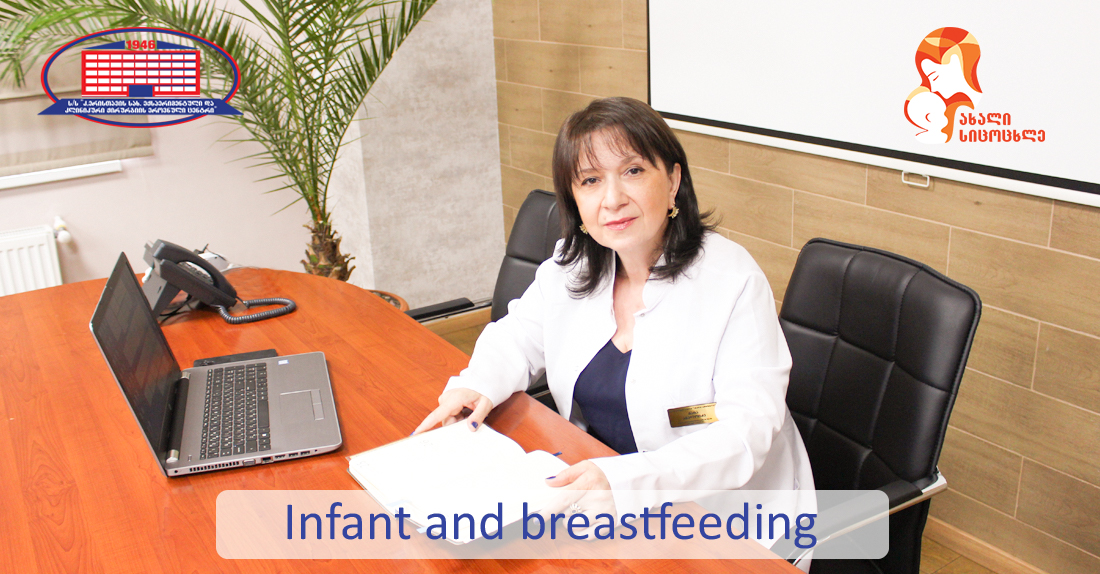
Mother's milk is a unique and full-fledged meal for an infant.
Mother’s milk is a living substance that constantly changes according to the needs of a child.
It shall be mentioned that it contains the best ratio of all vital substances – water, fat, carbohydrate, vitamin, mineral, ferments, and proteins.
Mother’s milk protects the baby from various infections and diseases. It’s easy to digest and helps with full physical and mental development. It is safe! Also, it helps develop tongue and facial muscles, which is extremely important for oral communication.
Maia Abaloidze, the head of the neonatology services of the clinic “New Life”, National Center of Surgery, discusses breastfeeding i.e. lactation.
– Dr. Maia until what age is it recommended to breastfeed?
– It's recommended to breastfeed a baby till the age of 2 (at the age of 2 – at least once a day), because the mother's milk protects the baby from various diseases.
– How long should mothers go without breastfeeding?
–Mothers should breastfeed according to the frequency of a baby's needs and not hourly, all day and night. Within the first month, an infant should eat 8-12 times in 24 hours. Infants develop their eating regime after a month or two.
– How does the mood and emotions of a mother affect lactation processes?
– During breastfeeding, the woman's body produces a hormone that regulates the amount and secretion of milk.More frequently the mother feeds the baby, the more milk is produced. A woman's body produces as much milk as it gives. Also, several psychological factors help produce milk - for example, a mother’s desire to breastfeed, her positive mood, skin to skin contact between mother and her child, a peaceful and cozy family environment.
– What kind of nutrition should mothers have during lactation? What is prohibited in this period?
– The nursing mother's full-fledged meal is necessary not only for the mother's health but also for the baby's growth and development. Mother’s nutrition should meet her body’s need for energy, nourishment, proteins, fat, and carbohydrates.
Following is recommended:
- Boiled beef, turkey or chicken meat;
- Milk, matsoni (fermented milk), sour cream, and cottage cheese;
- Sunflower and olive oils;
- Various cereal-porridges, whole grain bread;
- Fruits and vegetables.
Easily digestible carbohydrates (sugar, honey, pastry) isn't recommended. A nursing mother should consume the right amount of liquid.
Mothers should be careful with certain products that have the potential to cause the baby’s allergic reaction or colic (painful spasms caused by the air collected in intestines).
Following are the products that cause allergies:
- Nuts
- Walnuts
- Honey;
- Fish;
- Eggs;
- Chicken broth:
- Fresh milk;
- Citrus;
- Apricot;
- Melon;
- Strawberry;
- Chocolate;
- Caffeine and alcohol should be limited. Consumption of tobacco should be prohibited during breastfeeding.
– Which products help increase breast milk supply?
– The following products help increase milk supply: milk products, products rich in vitamins (especially fruits and vegetables), bread and various cereals. Moreover, there are various medications and special tea that help increase not only milk supply but also lactation.
–How should we know if an infant consumes enough amount of milk?
– An infant consumes enough milk If s/he urinates 6-8 times a day and night,has a daily bowel movement, is calm and sleeps at least 2 hours after eating, and steadily gains weight – approximately 150-200 grams a day.
–How should a mother feed a baby if she doesn’t have milk? What are other alternatives?
–I'd like to remind you that every woman has the ability to feed the baby with her milk if she follows breastfeeding principles and techniques. Albeit, unfortunately, there are cases when a mother doesn’t have milk.
Mother’s milk is one of a kind, but manufactured adapted mixture is the best alternative to breast milk. All manufactures mixtures are identical and consist of vitamins, iron, calcium, iodine and etc.
The formula I is given to an infant within the first 6 months old, whereas Formula II – after 6 months.
– Is cow’s milk good for an infant?
– Cow’s milk is not recommended for babies within the first 12 months, because it has 3 times more protein than mother's milk and 2 times more than milk formulas. Cow's milk consists of 3 times more calcium, phosphorus, and other minerals. Extra proteins and minerals are harmful to the baby. Keep in mind that cow's milk causes malabsorption of iron and anemia.
– When is it not recommended to breastfeed?
–There are side effects of breastfeeding for both, mother and her baby. For mothers there are absolute and temporary side effects: Absolute - HIV and human T-lymphotropic virus seropositive mother; temporary – open tuberculosis, consumption of several medications (cytostatics, radioactive drugs), herpes on teats, mammary gland abscess and also the consumption of drugs. For babies, absolute side effects are – phenylketonuria (congenital disorder of amino acid phenylalanine metabolism), galactosemia (congenital disorder affecting one’s ability to metabolize galactose into glucose) and maple syrup disease (MSD).
Particular health conditions of infants negatively affect breastfeeding:
- Severe neurological disorder;
- Very premature birth;
- Acute respiratory failure;
- Congenital decompensated heart defect
- Tongue-tie
- In all mentioned cases, it is recommended to feed the baby with pumped milk.
What’s your opinion on mothers who willingly suppress lactation and dried up breast milk?
– An infant comes into the foreign world, where s/he very much needs a mother, her affection, to touch and watch her as she breastfeeds. Breastfeeding significantly decreases sickness in children, helps develop an emotional bond and brings peace to a child. I ask every mother not to raise a child without mother’s milk. Don’t suppress lactation.
Wish you health!









